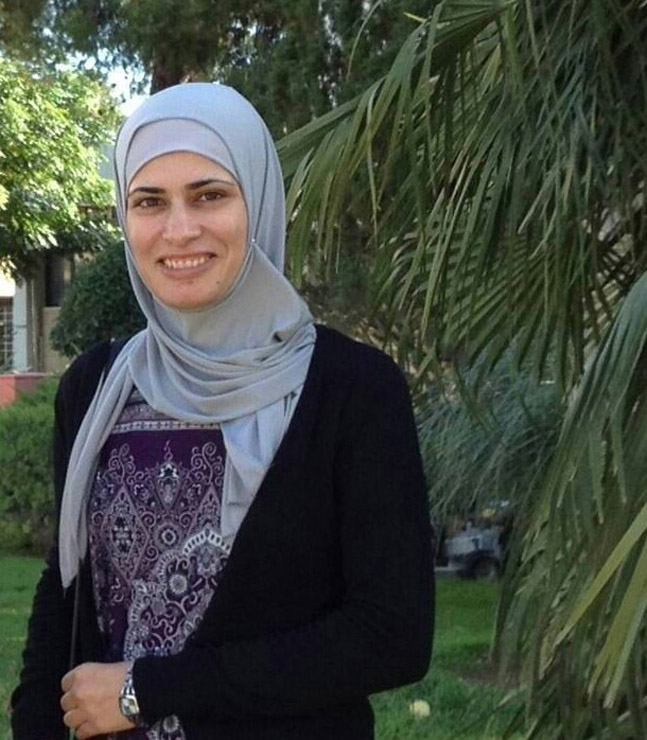News from the Chapters - Meet the Chair of the Middle East Chapter
Newsletter
It’s not easy chairing a Chapter, particularly during a pandemic. But Amani Alawamleh makes it look easy.

Amani Alawamleh, in her own words
My doctoral degree is in Agriculture Technology and Biotechnology (Sustainable Plant Production and Protection). I have worked as an early-stage researcher in the Marie Skłodowska-Curie actions (MSCA) Innovative Training Networks (ITN) European Industrial Doctorates (EID) project INTERFUTURE (From microbial interactions to new-concept biopesticides and biofertilizers).
The research project was hosted by the University of Molise in Italy and Biobest Group in Belgium, between 2017 and 2021. The research activities focused on the selection of microorganisms to develop new tools for the management of the invasive pest Drosophila suzukii.
Currently, I am working as the Head of Studies and Socio-economic Surveys Division at the Ministry of Agriculture in Jordan. I am a member of several national and international societies such as Jordanian Society for Organic Farming (JSOF) and International Organisation for Biological Control – Working groups (IOBC – WPRS).
As a co-founder of the Middle East Chapter, and former vice-chair (2019-2021), Amani currently serves as the new chair. She is committed as ever to realising her vision for the Chapter. “The success of the Chapter depends on the involvement of the members with the will to create something beneficial altogether. I strongly believe that active participation in planning, budget management, and communication is the key to a successful Chapter,” she explains.
But this past year has been lined with challenges, mainly due to the COVID-19 pandemic. “The main challenges faced were limitations in holding physical meetings, and having to make greater use of online communication tools that require a level of access,” says Amani.
For instance, the lockdown measures to contain the spread of the coronavirus meant the Chapter had to cancel a number of planned events.
In view of these unprecedented challenges, Amani is proud to highlight that the Chapter’s board worked hard to ensure its constant growth. It produced several publications that have been published via the MCAA Newsletter and promoted on social media (LinkedIn, Twitter and Facebook).

The Chapter also took its activities online. “We organised an online event to help Chapter members know what tips and tricks can help them in having an edge in their MSCA Horizon Europe and proposals. On behalf of the board, I would like to thank all members for their valuable contribution and commitment during this challenging year,” says Amani.
More meetings
Amani is already working on future activities. “We have various seminars planned for the coming year and we have started preparing presentations that we will be showcasing at diverse universities in the Middle Eastern region. We also plan to participate in the events organised by the different Chapters and working groups and to try and have a physical presence in the MSCA General Assembly where we can attract new members to our Chapter,” she says.
The Middle East Chapter is a network hub which aims to focus on members’ activities in countries of the region. “The Chapter encourages productive collaborations and networking between academia and industrial bodies, in the member countries and EU institutions,” says Amani. “We will also be forming collaborations with universities so that we can establish long-term relationships.”
Her agenda also includes providing assistance to Middle Eastern MSCA fellows to integrate into their hosting countries. Promoting membership is also a top priority. “Currently, we have 17 active members,” she says. “Through the continuation of events that can benefit our members, we hope to not only retain current members, but also to grow and expand our Chapter’s membership. We are targeting about 30 members in the first year of the serving period.”
‘Meet and greet’
In September, the Chapter organised a ‘Meet and Greet’ event. “Importantly, we were able to attract new board members and set the date of the board meeting to establish the internal organisation of the Chapter and handle responsibilities. The board agreed on the assignment of Vice Chair, Events Managers, Communication Manager, and Secretary positions,” explains Amani.
“Being a member provides lifetime benefits in terms of professional development, expanding networking, and cooperation. Also, it supports members by offering access to training and e-learning platforms and optimising resumes. Last but not least, our members are spread across a wide geographic area and there is a chance that a new fellow can find one of our members in their host institutes that can help him or her integrate into the country and start the MSCA fellowship,” she concludes.
Aurélia Chaise
MCAA Editorial Team